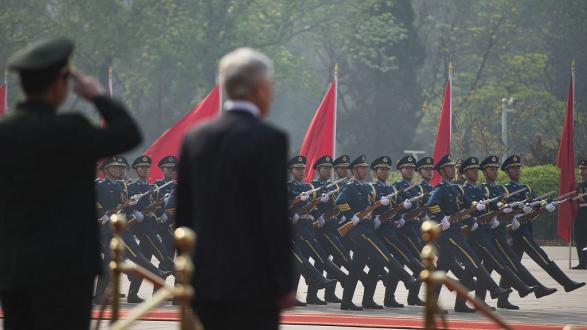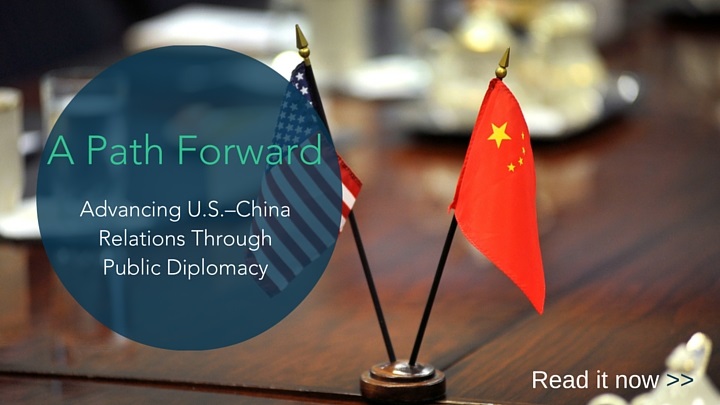The following is an excerpt from a new report by Pacific Council President and CEO Jerrold D. Green, Communications Associate Justin Chapman, and Events Officer Alexandre Moore on the role of public diplomacy in the U.S.-China relationship. The report was presented at the 2016 China-U.S. Diplomacy Summit held at Renmin University in Beijing on June 19, 2016. Read the report in full.
____________________
The armed forces of the United States and China may have a complex professional relationship, but in recent years bilateral cooperation has deepened. Now, the military-to-military relationship has the potential to alter the adversarial narrative in both countries. Both sides know that in contentious arenas like the South China Sea, rivalry could boil over into something far more costly.
We have already seen limited examples of positive engagement between the U.S. and Chinese armed forces. When the United States Navy recently sent a carrier strike group through the South China Sea, Rear Admiral Marcus Hitchcock was highly complimentary of his Chinese counterparts, saying that he was engaged on an almost "twenty four-seven basis" with a "completely professional" People’s Liberation Army Navy (PLAN). This mutually respectful and open-line approach by the two forces fostered a safe and non-threatening environment in which they could operate despite their differences. In summer 2016, the PLAN is expected to join military exercises known as RIMPAC near Hawaii beginning June 30, which will further that cooperation.
"Where the People’s Republic of China is building real naval capabilities, most are actually best suited for cooperating, rather than competing, with other world powers," writes David Axe in The Diplomat. "Indeed, there are signs that China intends to be a full partner in a loose, emerging alliance of developed world navies aiming to suppress piracy and seaborne terrorism and to provide rapid relief in the wake of coastal natural disasters."
The aggressive spirit behind China’s maritime activity has not been overlooked.
On the other hand, during the recent rollout of a Department of Defense report to Congress on Chinese military and security developments, Deputy Assistant Secretary of Defense for East Asia Abraham Denmark stated that China’s Coast Guard and fishing vessels sometimes act in an "unprofessional" manner "in the vicinity of the military forces or fishing vessels of other countries in a way that’s designed to attempt to establish a degree of control around disputed features. These activities are designed to stay below the threshold of conflict, but gradually demonstrate and assert claims that other countries dispute."
The aggressive spirit behind China’s maritime activity has not been overlooked. The actions taken by China’s fishing fleet and Coast Guard, including their land reclamation efforts in the South China Sea, has pushed many of its neighbors such as Vietnam and the Philippines to deepen their ties with the United States in an attempt to balance against China. This rebalancing has seen the Philippines invite American troops back for the first time since expelling U.S. forces from the country nearly 25 years ago, and, even more extraordinarily, has seen the complete end to the U.S. arms embargo on its Cold War-era foe Vietnam.
These developments clearly run counter to China’s strategic interests. However, Beijing must not resent Washington for reacting to the demands of its regional partners. Instead, China should take note of the second and third order effects that its aggression is having on its long term strategic interests in the region and abroad.
If China’s commitment to a cooperative – rather than competitive – approach is genuine, Beijing will need to bring the professionalism of its Coast Guard and the behavior of its fishing fleet fully in line with that of its navy. As it stands, China’s Coast Guard and fishing fleet communicate less effectively and more aggressively than their counterparts in the PLAN.
Cooperation on these challenges would go far in helping to create a new narrative between everyday Chinese and Americans regarding the relationship of their countries’ armed forces; particularly with the proper media focus, shift in public statements by government and military officials, and vocal support for such efforts from academics and think tanks. Greater engagement and interaction between the upper echelons as well as the rank and file of the two forces could help empower moderate voices within both organizations as their working relationship expands.
____________________
Dr. Jerrold D. Green is the President and Chief Executive Officer of the Pacific Council on International Policy. Read more about his background.
Justin Chapman is the Communications Associate of the Pacific Council on International Policy. Read more about his background.
Alexandre Moore is the Events Officer of the Pacific Council on International Policy. Read more about his background.





